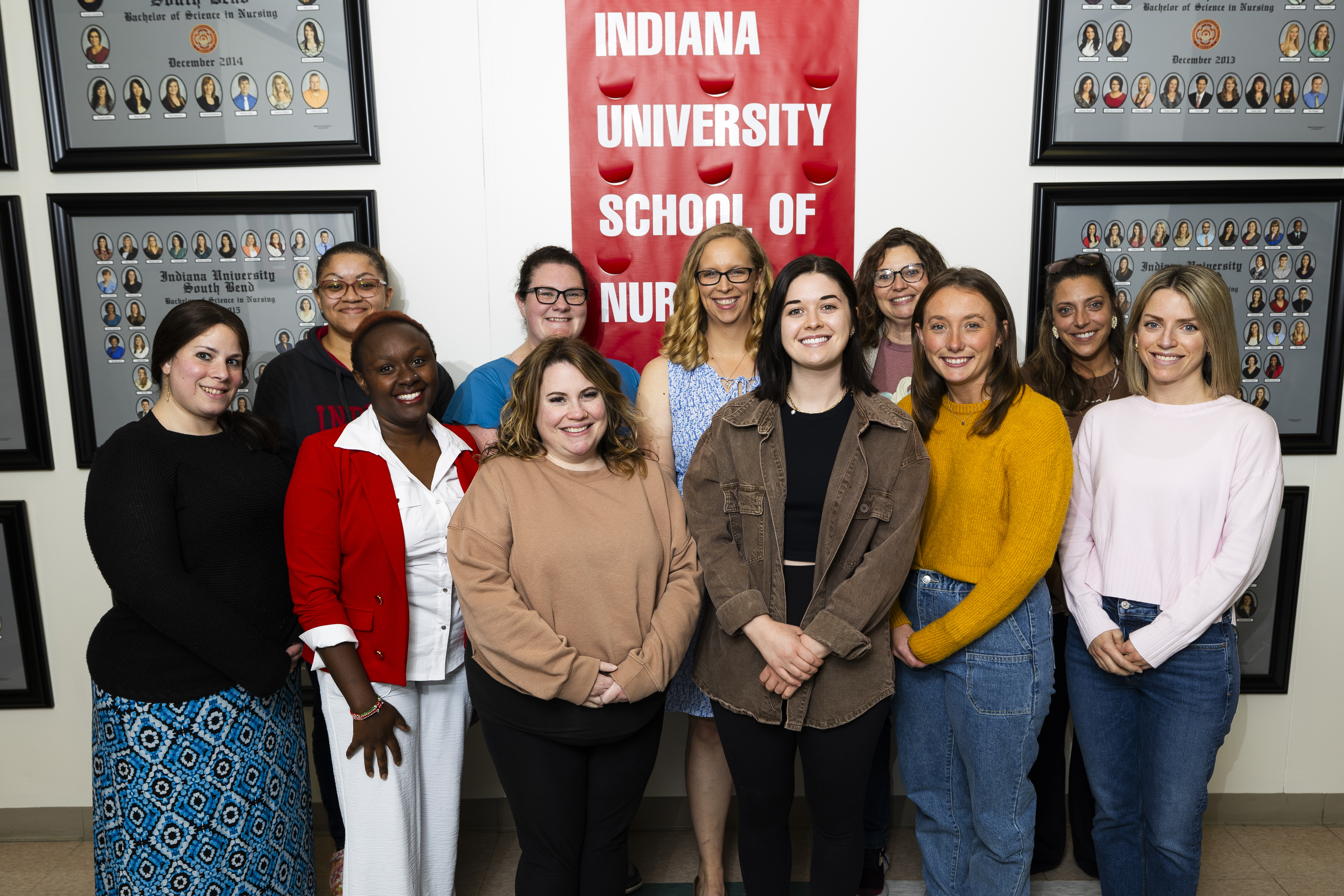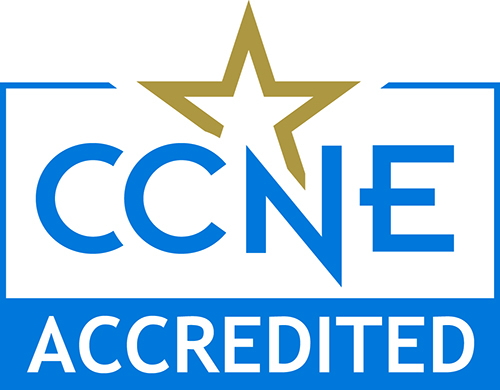The MSN Program at IU South Bend is part of the IU Regional MSN Consortium. It offers four tracks: Nursing Administration, Nursing Education, Family Nurse Practitioner (FNP) and Post Masters Family Nurse Practitioner Certificate. Its courses use web-based and video technologies for maximum convenience. Serving in education, leadership, advanced, and administrative roles will provide opportunities for enhanced health care delivery systems and ultimately improved health for citizens. Nurses with master's preparation are and will continue to be in strong demand. Health care is a growth industry. Continued regional growth in health care cannot be sustained without advancements in the level of nursing care.
Admission Criteria for all MSN Tracks
- BSN Undergraduate GPA: 2.8 or higher on a 4.0 scale from an NLN CNEA, ACEN, or CCNE accredited program. Official transcripts need to be submitted from all post-secondary coursework.
- Copy of current RN license: Current unencumbered license or multistate license as a Registered Nurse (RN) in the states where practicum experiences will be completed.
- Statistics grade (by transcript or current completion at IU campus): Applicants need to have a grade of C or higher in a three credit, undergraduate college credit statistics course (or successfully complete prior to Research, R500).
- Personal Statement (goal statement): An essay that addresses the following:
- Identify your academic goals, career objectives, why you are applying to this program and the qualifications you have that make you a strong candidate for admission. (200-word count limit)
- Describe significant professional and life experiences that have prepared you for a master’s education. Please discuss these experiences in detail. (400-word count limit)
- All students contribute to creating a diverse and inclusive environment when diversity is broadly defined. Whether by a personal attribute, characteristic, culture, experience, or behavior, please tell us how you believe you will contribute to the diversity of Indiana University and the nursing profession. The concept of diversity includes the following dimensions: race, ethnicity, gender, sexual orientation, socio-economic status, age, physical abilities, and religious beliefs. (200-word count limit)
- Criminal Background Check and Urine Drug Screen: Access information to Castlebranch will be sent to applicants.
- CV/Resume: Upload to application
- References: Upload to application
- Clinical practice. For the FNP track, two years of relevant full-time clinical practice as a Registered Nurse (RN) and currently working as an RN is preferred. For the education or administration track, one year of clinical experience as an RN is preferred.
Admission Cycles:
Family Nurse Practitioner/Post Master’s Certificate: Apply Now!!
Admission for the FNP track and Post Master’s Certificate occurs once a year with classes starting in January. The application cycle opens on April 1st and closes on September 15th.
Nursing Administration and Nursing Education:
The Nursing Administration and Education Tracks accept applications on a rolling basis, so you may apply at any time. You can begin coursework in the fall, spring, or summer session.For Summer and Fall 2025: Apply Here
To start courses in 2026: Apply Here
Create an account in the WebCAS system. Once in the WebCAS application, search for Nursing MSN and select the track of interest (FNP, Post Masters FNP, Admin, Education).
Four Convenient Track Options: Family Nurse Practitioner, Post Masters FNP Certificate, Nursing Administration, and Nursing Education
Family Nurse Practitioner (FNP) Track:
- A balance of online learning and face to face clinical that mirrors today's work environment with some classes meeting synchronously online up to 4 times per semester. Over 80% of the program is available online (lecture classes online, lab and clinical in person)
- Participate in a program that includes two major learning sections: preclinical scholarly application courses that provide a core foundation for advanced practice clinical courses that build on the preclinical foundation and add knowledge and applications used during direct clinical
- Faculty assist students with finding clinical placements. Complete 600 clinical hours under the guidance of faculty members and preceptors.
- This degree qualifies graduates to sit for one of the two national FNP certification exams: ANCC or AANP.
Post Master’s FNP Certificate:
- The Post-MSN graduate certificate option is available if you already hold an MSN degree and are seeking to become certified in an additional specialty area.
- Post-MSN certificates are available in the FNP track. The number of credit hours required to earn the certificate varies based on your previous education.
- Faculty assist students with finding clinical placements.
- Complete 600 clinical hours under the guidance of faculty members and preceptors.
- This degree qualifies graduates to sit for one of the two national FNP certification exams: ANCC or AANP.
Nursing Administration Track:
- A balance of online learning and practicum that mirrors today's work environment with some classes meeting synchronously online up to 4 times per semester. Over 80% of the program is available online (lecture classes online, lab and practicum in person).
- The Nursing Administration track will enable you to function in advanced level management positions requiring an advanced nursing degree in hospitals, clinics, surgery centers, extended care facilities, and nurse managed health centers as well as a multitude of community agencies are potential employers of advanced practice nurses.
- Nurses with this advanced knowledge will enhance health care for the community and impact the health care delivery system.
- Faculty assist students with finding practicum sites.
- Complete 300 practicum hours under the guidance of faculty members and preceptros.
Nursing Education Track-
- A balance of online learning and practicum that mirrors today's work environment in a hybrid format with some classes meeting on-campus and some synchronously online up to 4 times a semester. Over 75% of the program is available online (two lecture classes on campus, the rest online, lab and clinical/practicum in person).
- The Nursing Education track will prepare you for faculty roles at universities and colleges and as staff educators in healthcare institutions, addressing the existing nationwide shortage of nurses and well-prepared nursing faculty.
- Faculty will assist students with finding practicum sites.
- Complete 300 practicum hours under the guidance of faculty members and preceptros.
Indiana University South Bend MSN Transfer Credits Policy
TRANSFER STUDENTS (INTERCAMPUS TRANSFER)
Intercampus transfer requests are evaluated individually on the basis of the student’s academic record, the availability of space in the required courses, and faculty and facility resources.
TRANSFER FROM NON-INDIANA UNIVERSITY NURSING PROGRAM
Graduate nursing students in good academic standing at another university who wish to transfer should contact the Graduate Program Director at cwendelb@iu.edu. Graduate courses completed at other universities must be evaluated by the Graduate Program Director for transfer equivalency and for student placement. This process can take time; therefore, students are encouraged to make the request at least two months prior to the semester they wish to begin. Transfer students are evaluated by the Graduate Faculty for admission on a case-by-case basis. A maximum of 9 graduate transfer credits are usually all that can be accepted. Courses must have been taken at an accredited school and completed within 5 years of the date of the petition with a grade of B- or above.
Indiana University South Bend MSN Transfer Credits Procedure
Prospective students wanting to transfer MSN credits petition the Graduate Program Director (cwendelb@iu.edu) to review graduate level courses taken elsewhere for credit in the MSN track must submit the following:
- A formal, written request to the Graduate Program Director for course review. This request must list the course(s) to be reviewed, including course number, course title, number of credit hours, grade earned, and semester/year completed.
- Official transcripts for all requested courses to be reviewed.
- Syllabus for any course may be requested from the Graduate Program Director
Students must submit copies of the syllabi for each graduate course completed at another university. The syllabi must be evaluated in comparison to the IU graduate course requirements. IU courses from other campuses, if they pertain to the IU South Bend curriculum, will be accepted without further review and without limit as long as taken within the last 5 years.
Program Length
- Administration and Education tracks: Completed in six semesters (including Summer).
- FNP track: Completed in seven semesters (including Summer).
- Post Masters FNP Certificate: Completed in four semesters (including Summer).
Tuition Information
Tuition adjusts each academic year and depends on the credit hours taken. Find tuition, fees, in-state vs. out-of-state tuition, residency requirements, and payment information at the IU South Bend Bursar Office.
Admissions Questions
Have questions about the admissions process?
Mailing Address
Indiana University South Bend
Dwyer College of Health Sciences
Division of Nursing Science
c/o Graduate Program Director
1700 Mishawaka Ave PO Box 7111
South Bend, IN 46634-7111
See the Application Process here
Create an account in the WebCAS system.Once in the WebCAS application, search for Nursing MSN and select the track of interest (FNP, Post Masters FNP, Admin, Education). For Administration and Education, there are Fall 2024 and Spring 2025 applications.



